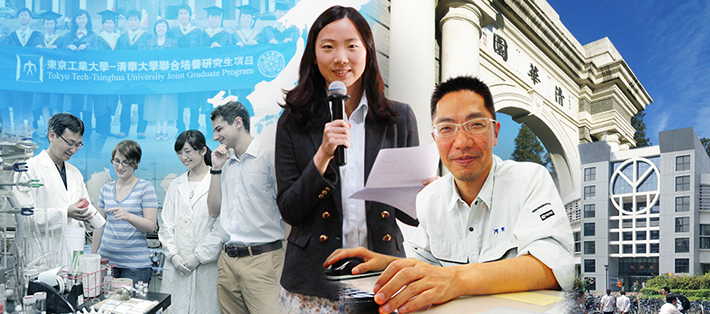
Outline of the program
The Tokyo Tech-Tsinghua University Joint Graduate Program is a graduate-level dual degree program offered by Tokyo Tech and Tsinghua University (THU), renowned research universities in Japan and China. The program was launched in 2004 as a dual master's degree program in Nanotechnology, Bioscience and Biotechnology, and Decision Science and Technology, and has produced approximately 150 graduates so far. While earning degrees from both institutions, students not only acquire specialized knowledge and skills, but also attain linguistic proficiency in Japanese, Chinese, and English, and gain a deep familiarity with the culture and customs of both Japan and China.
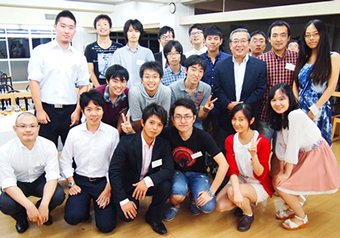
THU students with Tokyo Tech then-President Yoshinao Mishima before returning to China
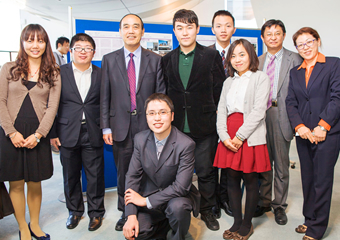
THU students with former THU Vice President Si Yuan at Tokyo Tech celebrating program's 10th anniversary
Two graduates making an impact in Japan and China talked about their current situation and views on the future of the program.
Fostering trust and developing new technology
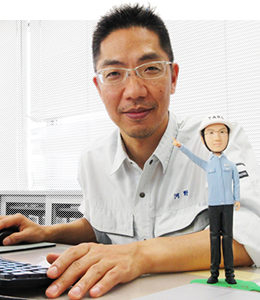
Shunji Kono
Plastics Technical Department, Toray Industries, Inc.
Graduated from Tokyo Tech's Department of Organic and Polymeric Materials and THU's School of Materials Science and Engineering in 2007
After joining Toray, Kono enrolled in the Nanotechnology Course of the program. He worked at Toray Fibers & Textiles Research Laboratories (China) Co. Ltd., Shanghai branch (currently Toray Advanced Materials Research Laboratories (China) Co., Ltd.).
What kind of work do you do now?
After spending time at the Shanghai laboratory doing research and development work for the Chinese market, I came to the Plastic Technical Department in Japan. As a member of the headquarters for technology development, my experiences in China have been useful in liaising with other development centers around the world to develop materials for the global market.
What was life like as a student?
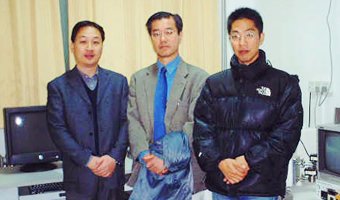
Kono with Prof. Su-Ming Xie at THU lab
I had the pleasure of engaging in cutting-edge materials development with world-famous researchers such as Professor Mitsuru Ueda (now professor emeritus), and discussions with industry researchers and students, particularly those from China, India, and Thailand, were very refreshing. I also gained rich experiences outside my research activities. One memory of a train trip I took with my Tsinghua lab mates is particularly vivid. The inn we stayed at cost the three of us 1,500 yen per night. In the evenings, we bought fresh ingredients at the market and cooked dinner in our room. The mid-summer trains were crowded and had no air-conditioning, and the journeys would sometimes last five hours. As an employee dispatched from a company, my experiences both inside and outside the university were very enjoyable.
What effect has the Joint Program had on your career?
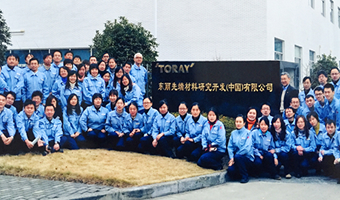
Colleagues at Toray Fibers & Textiles Research Laboratories (China)
I spent seven and a half years at the Shanghai laboratory working on R&D for the Chinese market. I needed to clearly understand the opinions of Chinese customers and combine this understanding with a deep knowledge of Japanese technology. Many talented Chinese researchers and most of the customers spoke English, but not Japanese. As my job was to bridge these people with Japanese technology and create new technology, the technical discussions held in Chinese during the Joint Program proved to be extremely useful. This ability to communicate directly with Chinese people not only deepened my understanding of various issues, but also created a relationship of trust. This in turn enabled me to effectively collect accurate information directly connected to our business. Although I am now back in Japan, I am still in constant contact with my former lab mates and colleagues.
What are your thoughts and expectations regarding the future of the Joint Program?
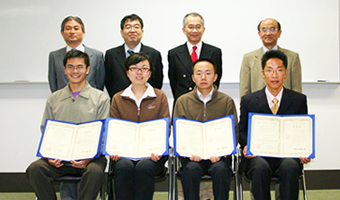
Receiving Tokyo Tech diplomas
Talented students overseas don't think twice about doing business all over the world. Many Japanese enterprises need engineers who don't shun away from international challenges. I really hope that students aim to become professionals who are globally active and make the world their playground.
Advancing economic and cultural exchanges
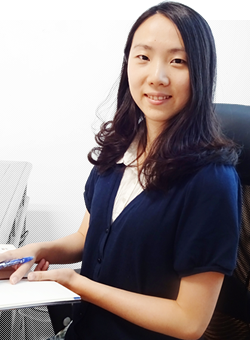
Yang Gao
Tsinghua-NRI China Research Center, School of Social Sciences at Tsinghua University
Graduated from THU's School of Social Sciences, and Tokyo Tech's Department of Industrial Engineering and Management, Graduate School of Decision Science and Technology in 2008
After completing the Decision Science and Technology Course of the program, Gao gained employment with Kanebo Cosmetics Inc. She later worked at the Beijing Branch of Nomura Research Institute Shanghai Ltd. and the Public Information and Cultural Affairs Section of the Embassy of Japan in China.
What kind of work do you do now?
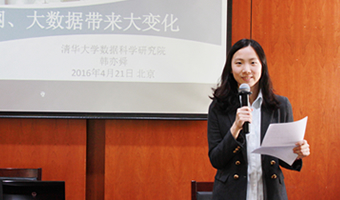
Gao moderating lecture on big data
I am a project manager at the Tsinghua-NRI China Research Center. I am responsible for managing joint research projects, international symposiums, and lecture sessions involving prominent researchers and company executives.
What was life like as a student?
I took the credits required by Tsinghua and Tokyo Tech in three years and wrote two master's theses, so it was tough. It was a very fulfilling time in my life, but at times I felt like crying. It was my first time living abroad alone, and I sometimes felt very lonely, but my seniors at the international student house were extremely helpful and friendly. My dearest memories include having fun at the campus and cooking delicious meals with friends.
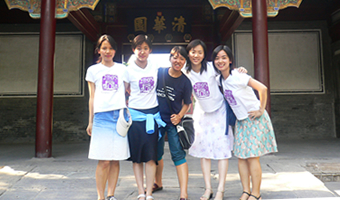
With friends from Tsinghua
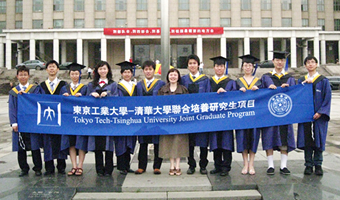
Group photo after graduation ceremony in front of THU Main Building
What effect has the Joint Program had on your career?
Before my current position, I worked for Kanebo Cosmetics Inc., Nomura Research Institute, Ltd., and the Public Information and Cultural Affairs Section of the Embassy of Japan in China. A consistent theme in all of my jobs has been the promotion of economic and cultural exchanges between Japan and China. I provide support to Japanese companies active in Beijing, introduce Japanese culture to local people, and arrange interviews with the Chinese media. I can do this precisely because of what I learned about Japanese culture at Tokyo Tech. When a fast-acting Chinese company attempts to do business with a meticulous process-oriented Japanese one, misunderstandings can occur. I can provide assistance in these kinds of situations because I am a graduate of the Joint Program.
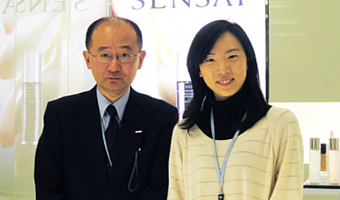
At Kanebo Cosmetics
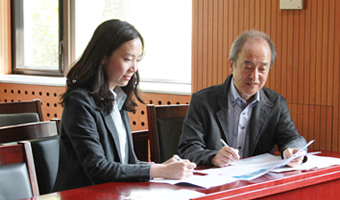
Briefing with supervisor
What are your thoughts and expectations regarding the future of the Joint Program?
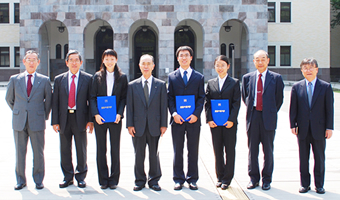
Group photo after graduation ceremony with Dr. Kenichi Iga, Tokyo Tech president at the time
Students with this type of qualification from both Tsinghua and Tokyo Tech can build any kind of career they want in Sino-Japanese relations. As graduates gain experience, their employment opportunities continue to expand. I hope the program continues to produce an increasing amount of talents in the future.
The Special Topics component of the Tokyo Tech Website shines a spotlight on recent developments in research and education, achievements of its community members, and special events and news from the Institute.
Past features can be viewed in the Special Topics Gallery.
. Any information published on this site will be valid in relation to Science Tokyo.

















